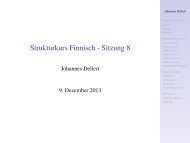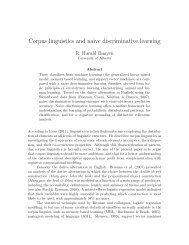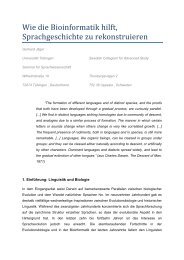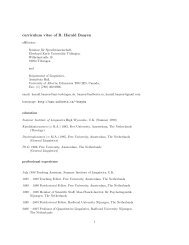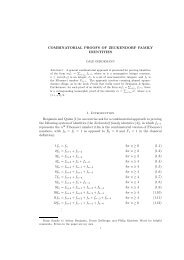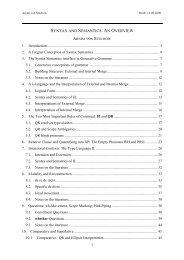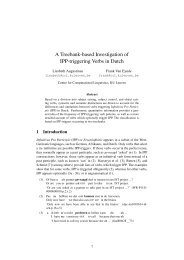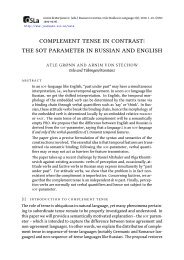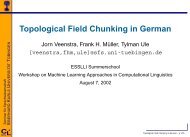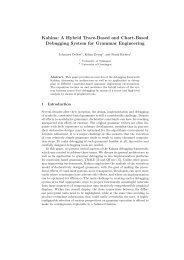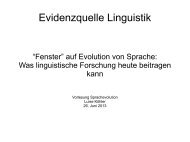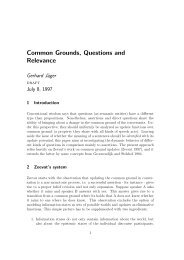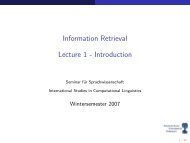Introduction to Linguistics
Introduction to Linguistics
Introduction to Linguistics
Create successful ePaper yourself
Turn your PDF publications into a flip-book with our unique Google optimized e-Paper software.
<strong>Introduction</strong> <strong>to</strong> General <strong>Linguistics</strong> WS12/13 page 4<br />
To understand this it can help <strong>to</strong> look again at the basic clause structures of the two<br />
languages. The only difference in clause structure is the order of elements in the VP and IP.<br />
(12) English: CP German: CP<br />
C IP C IP<br />
I VP VP I<br />
V objects etc.... objects etc... V<br />
Specifiers are always on the left, so adding in the specifiers of CP and IP gives us:<br />
(13) English: CP German: CP<br />
spec-CP C’ spec-CP C’<br />
C IP C IP<br />
spec-IP I’ spec-IP I’<br />
I VP VP I<br />
V (more VPs) (more VPs) V<br />
V .... ... V<br />
The two structures are identical on the vertical axis, that is in the hierarchy of CP > IP > VP.<br />
The specifiers are in the identical positions. Only the head – complement order in the VP and<br />
IP is different.<br />
2 German declaratives<br />
Declaratives and questions in English have different structures: a English declarative is an IP.<br />
Only the questions require a CP <strong>to</strong> make positions available: the C position for the finite verb<br />
in all questions, and the spec-CP for the wh-phrase in wh-questions.<br />
(14) [IP [DP Mary] will buy the cake] declarative<br />
CP [Cwill] [IP [DP Mary] buy the cake ] ]? yes/no question<br />
[CP [spec-CP which cake] [Cwill] [IP [DP Mary] buy ______ ] ]? wh-question<br />
German works differently. All main clauses are CPs because the finite verb always moves<br />
from I <strong>to</strong> C. This is why we get the German verb second effect. We can change all sorts of<br />
things in the order of the German main clause, but the finite verb stays in second position.<br />
(15) a. Der liebe Markus backt _____ jeden Monat einen Kuchen für die Nachbarin.<br />
b. Jeden Monat backt der liebe Markus _____ einen Kuchen für die Nachbarin.<br />
b. Einen Kuchen backt der liebe Markus jeden Monat _____ für die Nachbarin.<br />
b. Für die Nachbarin backt der liebe Markus jeden Monat einen Kuchen _____.<br />
In declaratives, additionally any one phrasal constituent moves in<strong>to</strong> the spec-CP position<br />
at the front of the clause (here: der liebe Markus or jeden Monat or einen Kuchen or ...).




